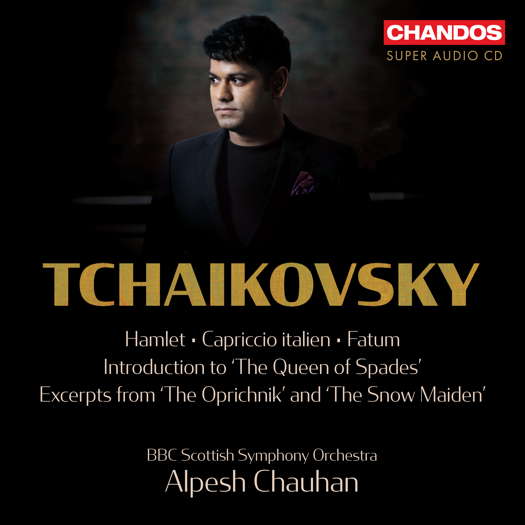
Fire and Brimstone
GERALD FENECH marvels at Alpesh Chauhan's new Tchaikovsky recording with the BBC Scottish Symphony Orchestra for Chandos
'... Chauhan's passionate approach is consistently vibrant, sensitive and fastidiously attentive to orchestral details.'
I must admit that when a Tchaikovsky disc lands on my desk for review I always feel a strong sense of excitement and expectation. And this disc in hand is certainly no exception. Firstly the pieces chosen for this album could not be more apt.
Why? Because three are familiar and the other three hardly make their presence felt in the concert hall. So there is a certain balance that makes this programme so entertaining and at the same time so exploratory.
Let us start with the first trio. Oprichnik was Tchaikovsky's third opera and the first to have any measure of success. The composer recycled much of the music of his earlier Voyevada, adapting it to the new libretto which he wrote himself. As the libretto goes, the words are a bit on the dull side, but Tchaikovsky's music mostly makes up for this limitation. Composed in 1869, the music is closer in style to the 'pure' Russian musical aesthetic principles of the 'Mighty Handful' than to the cosmopolitan 'westernized' Tchaikovsky of Romeo and Juliet.
Listen — Tchaikovsky: Dances (The Oprichnik Act IV No 15)
(CHSA 5331 track 2, 0:00-0:47) ℗ 2024 Chandos Records :
The story's title refers to young Andrej who decides to join the Oprichniks - Ivan the Terrible's personal guards - so that he may obtain justice from the Czar for the wrongs committed by Prince Zemchuznyi, who killed Andrej's father, thus leaving the boy and his mother living in poverty. There is also a love story between Andrej and Natalia, Zemchuznyi's daughter, which unfolds against the political background. This recording presents the sprightly dances from Act Four.
Composed in 1873, the incidental music to Alexander Ostrovsky's play The Snow Maiden was Tchaikovsky's first foray in the genre. The composer and the poet were jointly commissioned to write the piece by the famous Bolshoi Theatre in Moscow, which led to a close and very productive co-operation. In fact Tchaikovsky completed the lavishly scored work in only three weeks.
At the heart of the play is a popular Russian folk tale with a familiar fairy-tale motif: a mythical creature longs for a human soul and for the ability to experience love but is tragically destroyed by the irreconcilable differences between the human world and its mythical counterpart.
Listen — Tchaikovsky: Melodrama (The Snow Maiden Act II)
(CHSA 5331 track 7, 0:00-0:53) ℗ 2024 Chandos Records :
The music is not as glittering as in Tchaikovsky's later ballets, but there are many delightful tunes that hint to what was to come later on, and one of The Snow Maiden's greatest strengths is Tchaikovsky's expressive use of the string section of the orchestra. Excerpts from this work are included in this album.
Tchaikovsky started working on Fatum between early September and late October 1868. At this time he fell in love with soprano Desiree Artot, but the affair came to an abrupt halt when she suddenly left for Warsaw to join her opera company. The composer completed the outline by 21 October/2 November and finished the scoring in December 1868. The premiere took place on 15/27 February 1869 at a concert in Moscow conducted by Nikolai Rubinstein.
Tchaikovsky had not written it with any known programme but for the premiere the text of verses by Konstantin Batyushkov about the futility of human life were added as an epigraph to the score. The audience were taken aback by the melancholy theme of the Batyushkov verses, but the music was warmly applauded and many were of the idea that it was Tchaikovsky's best piece until then.
By September 1869, Tchaikovsky's view of Fatum had changed radically and he started to regard it as a huge failure. In the 1870s he destroyed the manuscript, and the piece remained unperformed and unpublished until 1896, three years after Tchaikovsky's death. But Fatum did not die forever. In that same year Mitrofan Belyayev reconstructed the work from the original orchestral parts, and Fatum was resurrected with the posthumous opus number 77.
Listen — Tchaikovsky: Fatum
(CHSA 5331 track 1, 0:02-0:53) ℗ 2024 Chandos Records :
In all truth, the work is indeed a bit uneven but some of the passages are more than worth hearing and, as a whole, the piece transmits life's futility in a very convincing manner. Tchaikovsky dedicated Fatum to his composer friend Mily Balakirev.
The notion of a 'Hamlet' piece was presented to the composer by his brother, Modest, in 1876 and Piotr Ilyich set to work immediately. But only some sketches emerged, and when the work was first premiered in 1888, the score was practically totally different. This symphonic fantasy is, maybe, the most dramatic piece that encapsulates Tchaikovsky's inner struggles and disillusions, but despite this brooding atmosphere almost throughout, the work is a perfect musical portrait of Shakespeare's play. Hamlet was dedicated to Edvard Grieg, who incidentally was a very close friend of the composer. Programme wise, Hamlet is an ideal partner to Fatum.
According to the composer The Queen of Spades, premiered in St Petersburg in 1890, is his operatic masterpiece. Quote:
Perhaps I am completely mistaken, but I believe The Queen of Spades to be my chef d'oeuvre.
The short Prelude recorded here lasts for only four minutes plus, but Tchaikovsky, being the genius of depicting psychological turmoil in musical terms, catches most brilliantly Hermann's inner conflict between his unconditional love for Lisa and his manic addiction to gambling, which eventually destroyed all he had hoped for, his life included.
Listen — Tchaikovsky: Introduction (The Queen of Spades)
(CHSA 5331 track 4, 3:15-4:09) ℗ 2024 Chandos Records :
Tchaikovsky wrote his exhilarating Capriccio Italien during a dark period in his life. The recent death of his father and the disastrous marriage to Antonina Milyukova had thrown the composer into a state of despair. On the advice of his brother Modest, Tchaikovsky left Paris for Rome in December 1879, and this change of air did alleviate, to a certain extent, his depressive mood. Indeed, he did manage to absorb some local colour, taking in Carnival at the end of January 1880. He jotted down much of the music that he heard there and spent time poring over collections of Italian folk songs and dances during his holiday.
All this material found its way into the Capriccio, and with its bright primary colours and arresting tunefulness, the work turned out to be one of the most direct of Tchaikovsky's pieces. Indeed, the Capriccio Italien is a swaggering paean to a city that obviously stirred something in the soul of this most sensitive of composers. Written between January and May 1880, the piece premiered on 18 December that year (New System) in Moscow with Nikolai Rubinstein conducting. It was dedicated to the famous cellist Karl Davydov.
Capriccio was an instant success, and since that premiere, the work has remained ever so popular with critics and audiences alike. This is 'fire and brimstone' music and Chauhan's passionate approach is consistently vibrant, sensitive and fastidiously attentive to orchestral details. The BBC Scottish Symphony Orchestra responds with some really affecting performances full of sparkling virtuosity and dramatic impetus that convey Tchaikovsky's rare gift of melody with utter conviction.
A marvellous Volume 2 in the ongoing Chandos cycle dedicated to this composer, in rich sound quality and deeply informative annotations. I await Volume 3 with wholehearted eagerness.
Copyright © 2 March 2024
Gerald Fenech,
Gzira, Malta






